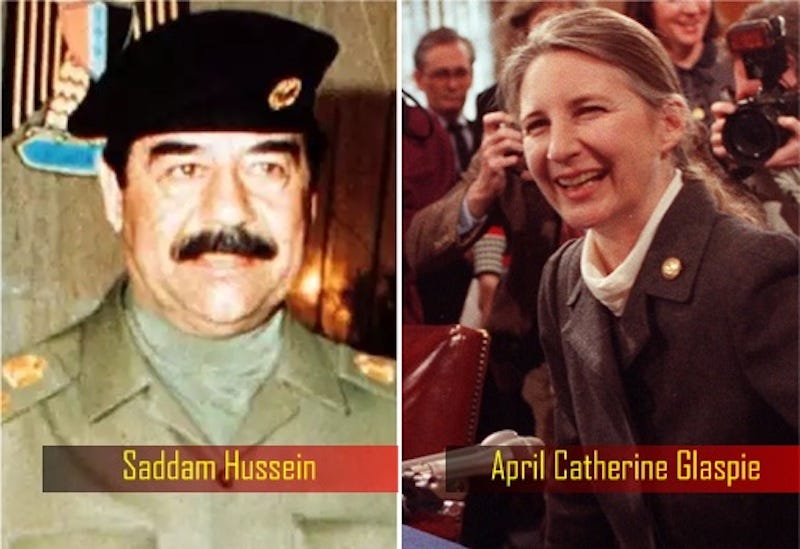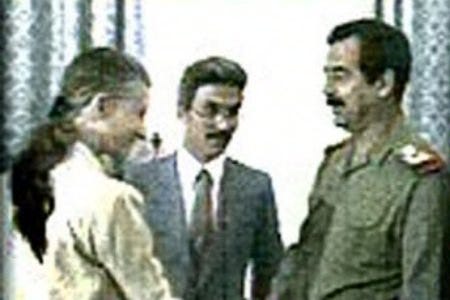On July 25, 1990, Saddam Hussein entertained a guest at the Presidential Palace in Baghdad: U.S. Ambassador to Iraq, April Glaspie.
Glaspie told the Iraqi president: “I have direct instructions from President (George H.W.) Bush to improve our relations with Iraq. We have considerable sympathy for your quest for higher oil prices, the immediate cause of your confrontation with Kuwait.”
Glaspie then asked, point blank: “Why are your troops massed so very close to Kuwait’s borders?”
“As you know, for years now I have made every effort to reach a settlement on our dispute with Kuwait,” replied Hussein, deploying his own rendition of wartime spin. “There is to be a meeting in two days; I am prepared to give negotiations only this one more brief chance.”
When asked by Glaspie what solutions would be “acceptable,” Hussein was forthright:
“If we could keep the whole of the Shatt al-Arab — our strategic goal in our war with Iran — we will make concessions. But, if we are forced to choose between keeping half of the Shatt and the whole of Iraq [Note: Hussein viewed Kuwait as part of Iraq] then we will give up all of the Shatt to defend our claims on Kuwait to keep the whole of Iraq in the shape we wish it to be.”
At this point, ever aware of the power dynamics at play, Hussein queried Glapsie: “What is the United States’ opinion on this?”
“We have no opinion on your Arab-Arab conflicts, such as your dispute with Kuwait,” Glaspie answered. “Secretary [of State James] Baker has directed me to emphasize the instruction, first given to Iraq in the 1960s that the Kuwait issue is not associated with America.”
Eight days later, Iraq invaded Kuwait and provided the Land of the Free™ with the pretext it needed to commence a relentless onslaught in the name of keeping the world safe for petroleum. Which brings me to a forgotten anniversary.
While August 6, of course, marks the anniversary of the nuking of Hiroshima, it also marks 33 years since the U.S. war against Iraq was initially launched.
For most people — particularly anti-war “activists” — the starting date for the war in Iraq is March 19, 2003. However, to accept that date is to put far too much blame on one party and one president.
A more accurate and useful starting date is August 6, 1990, when — at the behest of the U.S. — the United Nations Security Council imposed murderous sanctions upon the people of Iraq.
It is widely accepted that these sanctions were responsible for the deaths of roughly 500,000 Iraqi children under the age of five.
U.S. Ambassador to the UN in the mid-90s was Madeleine Albright. In 1996, Leslie Stahl asked her on 60 Minutes if a half-million dead Iraqi children was a price worth paying to pursue American foreign policy.
Albright famously replied: “We think the price is worth it.”
22 seconds:
Shortly after the above interview, Albright was named U.S. Secretary of State by President Bill Clinton.
This was not an aberration or something unique to one party or another. It is and has been the standard operating procedure of the Home of the Brave™ and its global partners.
The sooner we grasp this, the sooner we can appreciate the importance of uniting to create change.






Deplorable and deeply sad. Somewhere behind all these chess moves is a grand scheme they are not telling us about. 500,000 children is never a price we as humanity should ever be considering. That conversation was more about normalizing it for the American people than it was to create shock value. We have truly been under a trance for a long time.
Thanks for the reminder that war is a bipartisan affair. As Smedley Butler noted, War is a Racket. That’s a book that every HS kid should have to read so there patriotism isn’t used against them.
I’m working with a guy who was in the first gulf war. His PTSD from his experiences there sure didn’t help his alcoholism.
Imagine if war movies were just about the aftermath...